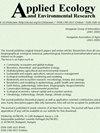Rapid environmental changes in the western antarctic peninsula region due to climate change and human activity
IF 0.6
4区 环境科学与生态学
Q4 ECOLOGY
引用次数: 24
Abstract
The Antarctic and the Southern Ocean are a critically important part of the Earth system. The climatic, physical, and biological properties of this region are closely linked to other parts of the global environment. 200 years of direct human impact, recent climate amelioration and changes in the main sources and circulation of biogenic compounds as well as accumulation of industrial contaminants have significantly affected the whole ecosystem. Particularly sensitive is the region of the Western Antarctic Peninsula, which is considered to be one of the hot spots of the Earth. In this paper, we review recent literature and compare it with historical data to estimate and predict the consequences of this process. The Antarctic ecosystems can no longer be regarded as pristine. Global as well as local human influence has transgressed the barriers isolating that continent from the rest of the World, causing previously observed changes to accelerate.气候变化和人类活动导致的南极半岛西部地区环境的快速变化
南极和南大洋是地球系统至关重要的组成部分。该地区的气候、物理和生物特性与全球环境的其他部分密切相关。200年来人类的直接影响、最近的气候改善、生物化合物主要来源和循环的变化以及工业污染物的积累对整个生态系统产生了重大影响。特别敏感的是南极半岛西部地区,该地区被认为是地球的热点之一。在本文中,我们回顾了最近的文献,并将其与历史数据进行比较,以估计和预测这一过程的后果。南极的生态系统再也不能被看作是原始的了。全球和当地的人类影响已经超越了将非洲大陆与世界其他地区隔离开来的障碍,导致先前观察到的变化加速。
本文章由计算机程序翻译,如有差异,请以英文原文为准。
求助全文
约1分钟内获得全文
求助全文
来源期刊

Applied Ecology and Environmental Research
ECOLOGY-ENVIRONMENTAL SCIENCES
CiteScore
1.40
自引率
14.30%
发文量
104
审稿时长
14 months
期刊介绍:
The Journal publishes original research papers and review articles. Researchers from all countries are invited to publish pure or applied ecological, environmental, biogeographical, zoological, botanical, paleontological, biometrical-biomathematical and quantitative ecological or multidisciplinary agricultural research of international interest on its pages.
The focus is on topics such as:
-Community, ecosystem and global ecology-
Biometrics, theoretical- and quantitative ecology-
Multidisciplinary agricultural and environmental research-
Sustainable and organic agriculture, natural resource management-
Ecological methodology, monitoring and modeling-
Biodiversity and ecosystem research, microbiology, botany and zoology-
Biostatistics and modeling in epidemiology, public health and veterinary-
Earth history, paleontology, extinctions, biogeography, biogeochemistry-
Conservation biology, environmental protection-
Ecological economics, natural capital and ecosystem services-
Climatology, meteorology, climate change, climate-ecology.
The Journal publishes theoretical papers as well as application-oriented contributions and practical case studies. There is no bias with regard to taxon or geographical area. Purely descriptive papers (like only taxonomic lists) will not be accepted for publication.
 求助内容:
求助内容: 应助结果提醒方式:
应助结果提醒方式:


